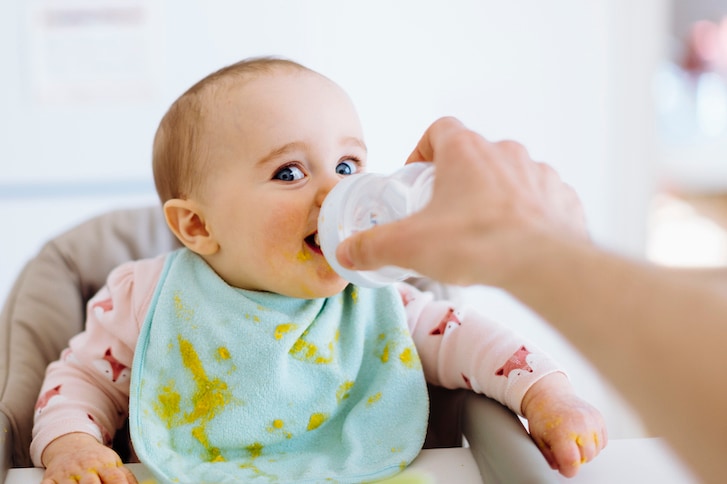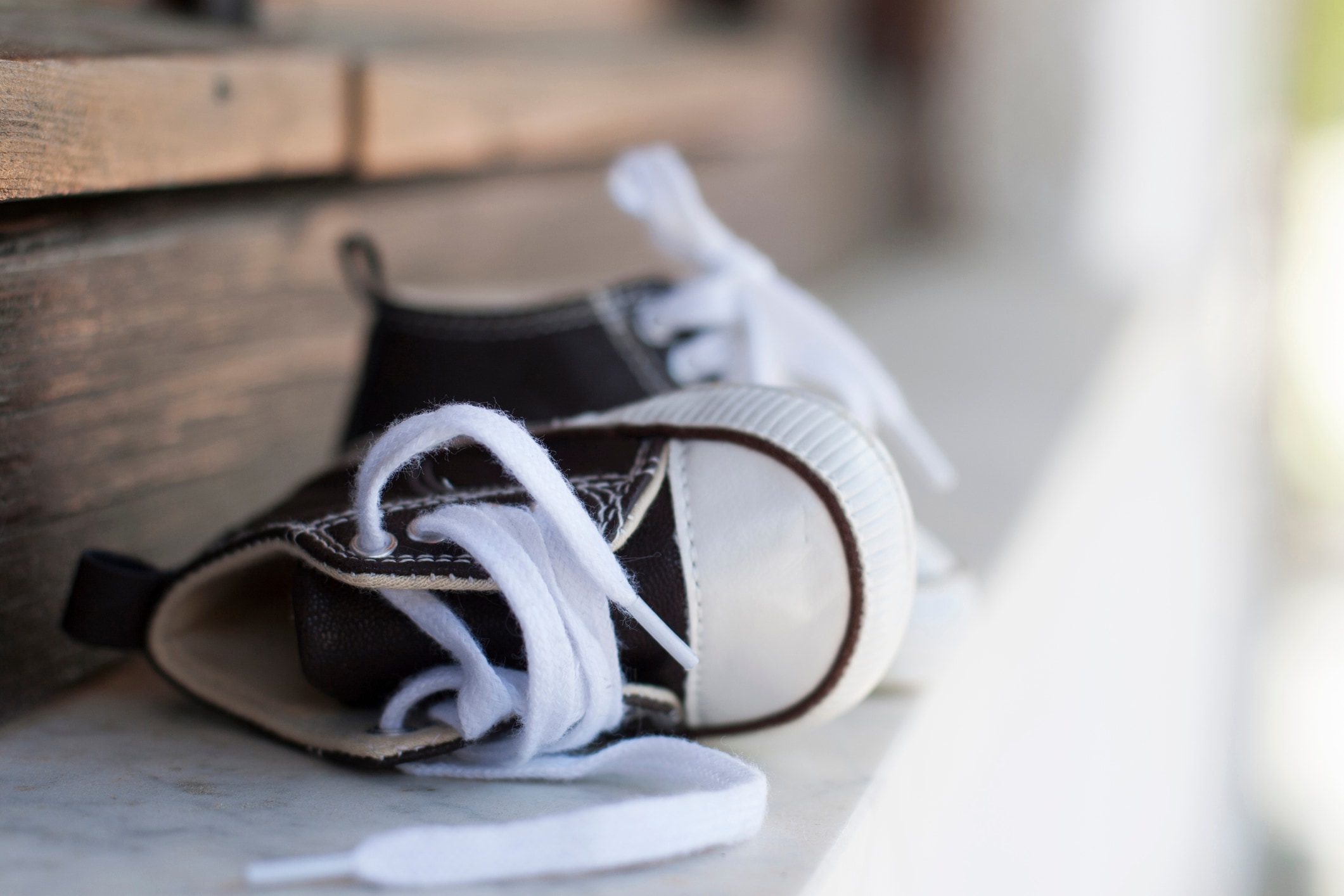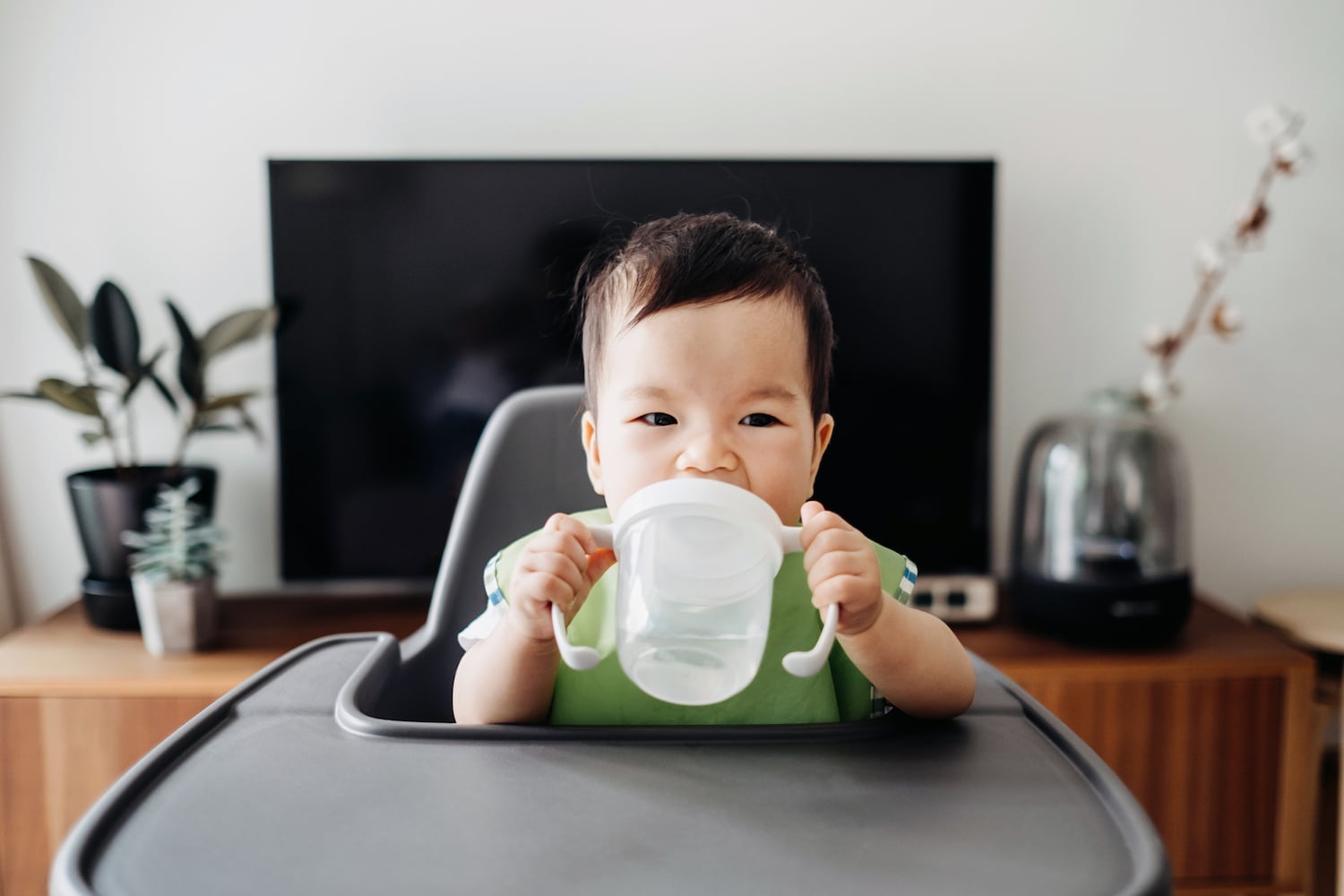You’ve probably heard that giving newborns water is a “no.” But beyond that, you may have a bunch of unanswered questions when it comes to giving infants and older babies water. For example, you might be wondering if there are special circumstances when you can give a newborn water, such as when it’s boiling hot outside. You also may be confused about when the “no water” stage ends, and how much water it’s safe to give your baby once it’s allowed.
We reached out to experts to answer these questions and more. Here’s everything you need to know about giving babies water and other beverages.
When can babies drink water?
The American Academy of Pediatrics (AAP) holds firm that the age that you can start giving a baby water is about 6 months, and not before this time. They recommend that you offer the baby small sips to start out, and gradually increase from there.
It’s no coincidence that 6 months is also the age that most doctors (and the AAP) recommend you start offering your baby solid food while still feeding them breast milk or formula.
“Water intake with solids is a good idea as it helps them digest the solid foods.”
—Rachelle Markham, lactation consultant
Water can be helpful as your baby starts to experiment with solids, says Rachelle Markham, an international board certified lactation consultant in private practice. “Water intake with solids is a good idea as it helps them digest the solid foods,” she explains. Water can also help if your baby starts to get a little backed up. “If your baby gets constipated with table foods, they may need more water with their meals — or foods high in water like watermelon,” Markham adds.
Can newborns drink water?
Your pediatrician likely told you not to give your newborn water, but what you might be unsure of is the “why” behind this recommendation. If newborns can drink breast milk or formula, why can’t they also have a little water?
Water can impact nutrition intake
According to Markham, there are two main reasons why parents should wait before offering their newborns water. The first has to do with how small your baby’s tummy is.
“It takes a lot of food to grow as much as newborns grow, and giving water to drink lowers their nutrition/calorie intake.”
—Rachelle Markham
Stomach capacity varies, and the stomach gets bigger as your baby grows. But your baby’s stomach can only hold about four ounces at a time (give or take), in the first few months of life. That’s why it’s important to fill your baby’s stomach with nutrients and calories, rather than plain water, says Markham. “It takes a lot of food to grow as much as newborns grow, and giving water to drink lowers their nutrition/calorie intake,” Markham explains.
Newborns are more prone to water intoxication
The other reason, says Markham, is that newborns are vulnerable to something called water intoxication. “Too much water can actually be toxic and cause a severe disruption of electrolytes necessary for organ function,” she describes.
Water intoxication can happen if you add more than the required amount of water to powdered formula or by supplementing a baby under 6 months with water. Signs of water intoxication include:
- Unexplained fussiness.
- Extreme drowsiness.
- A body temperature drop of less than 97 degrees.
- Urine color changes (more pale or clear than usual).
- Swelling of the face.
- Seizures.
Do babies need to drink water in the heat?
Even if you’ve been warned about not giving your newborn water, you may be wondering if an exception can be made when it’s a hot summer day. Well-meaning relatives might even be urging you to give your baby “just a sip” to keep them hydrated. You may also be wondering if it’s OK to give your baby extra water when they are sick with a fever. What to do?
“Newborns never need water,” says Dr. Pierrette Mimi Poinsett, pediatrician and consultant for Mom Loves Best. “If it is hot outside, you need to feed more formula or breastfeed more frequently.” The same is true if your baby is ill — the U.S. National Library of Medicine advises that you just continue formula feeding or breastfeeding in these circumstances.
“Newborns never need water. If it is hot outside, you need to feed more formula or breastfeed more frequently.”
— Dr. Pierette Mimi Poinsett, pediatrician
You can rest assured that offering more formula or breast milk will hydrate your baby — after all, both formula and breast milk are 85% water! If you are a breastfeeding parent, you may need to hydrate yourself more to keep up with your baby’s needs, Poinsett advises. But again, it’s never necessary to supplement a newborn’s feedings with water.
How much water can a baby have?
So let’s say you start giving your baby a little water once they are 6 months, and once they start eating solid foods. How much water should you give them, and does this change as they get older?
Poinsett breaks down the amount of water to give your baby at different ages:
6-12 months
From the ages of 6 to 12 months, your baby can drink about 4-8 ounces total per day, says Poinsett. “Tap water is okay, especially if it is fluoridated,” she advises. “So-called nursery water [sold in stores] is not necessary.” It’s best if water is given via a sippy cup, straw or plain cup instead of bottle, Poinsett adds. According to the AAP, using a cup rather than a bottle helps develop the skill of drinking from a cup and will also get your baby used to drinking water as a beverage.
12-24 months
By the time your child is a toddler, you can increase their water intake. “Toddlers aged 12 to 24 months can take 8 to 32 ounces of water per day,” Poinsett says. It’s at this point when formula-fed babies are transitioning to whole or reduced-fat milk, according to the AAP. They recommend you feed your baby about 16-24 ounces of cow’s milk per day. If you wean your baby from breastfeeding at this stage, you will also want to offer them cow’s milk at this time, in addition to water.
Breastfed vs. formula fed babies
You might be wondering if guidelines about introducing water are different based on how you feed your baby. The recommendation to wait till 6 months to add water to your baby’s diet is the same whether you breastfeed or formula feed, Poinsett confirms.
Once you start offering water to your baby, the AAP also notes that breast milk and formula should continue to be your baby’s primary source of nutrition and hydration for the first year of life, which is why you should take it easy on water, even once you introduce it. You don’t want it to replace your baby’s formula feeds or breastfeeding sessions.
Dominique Gallo, a lactation consultant and mom of three from Roanoke, Virginia, describes how she balanced breastfeeding with offering her babies water and other beverages. “I took it easy and followed my baby’s lead,” she says. She continued to nurse on demand and offered water with solid foods. “We increased the water intake as the baby showed signs of wanting/ readiness,” she says.
Can babies drink juice and other beverages?
Once your baby is eating solids regularly and has started to drink water and possibly other milks, you may be wondering what other beverages you can introduce to your baby. Poinsett says that plain water or milk alone really are the best choices for both babies and toddlers.
Poinsett recommends whole milk for toddlers aged 12-24 months and 2% milk for older kids. Breast milk is a great hydration source, she assures, and can continue for as long as you and your toddler wish.
“Other fluids are not necessary,” Poinsett states. “This includes toddler milk, flavored kinds of milk and sugary drinks, such as sports drinks, fruit drinks, lemonade, sodas, stevia-sweetened beverages and caffeinated drinks,” she says. These drinks can cause cavities in kids and can make them prone to obesity, she says.
Sometimes people think of juice as a healthy alternative to water, especially if it’s unprocessed and has no added sugar. But Poinsett says that the problem with juice is that kids can start to develop a preference for it over milk and plain water. Sometimes 100% fruit juice can be helpful if your baby is constipated, but she doesn’t recommend it otherwise.
Sticking to plain water worked well for Stacy Kucharczk, nurse practitioner, registered nurse, certified pediatric nurse practitioner, international board certified lactation consultant and mom of two from Chesapeake, Virginia. “When my children weaned from the breast as toddlers, they continued drinking water as their only beverage; they didn’t like cow’s milk, and juice wasn’t offered as an option as it is essentially just a bunch of sugar,” she shares.
The upside to all this? Her kids became lifelong water drinkers, which isn’t a bad thing at all. “My children continued to drink water as their preferred beverage even when they became teens,” Kucharczk shares.
The bottom line
Understanding the ins and outs of when and how you can offer water and other beverages to your baby can get confusing. But it’s actually fairly simple. Wait till your baby is 6 months, start slow and offer your baby water in a cup with their meals. After this, mostly stick with water and milk for your baby’s toddler years — and beyond.
Of course, all babies are different and may need different amounts of water based on their health needs. If you have any questions about how and when to offer your baby water, reach out to your pediatrician.





